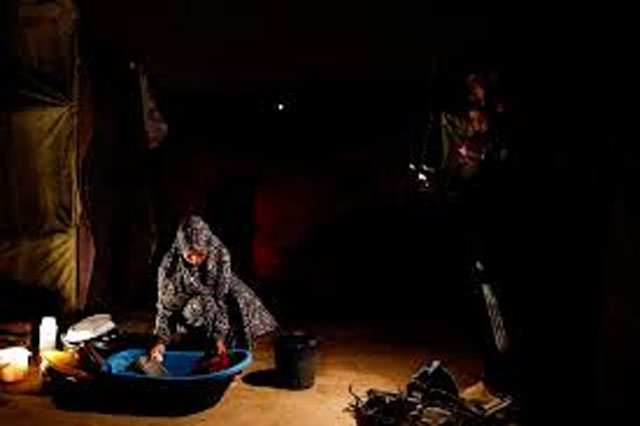Daijiworld Media Network - Gaza
Gaza, Nov 12: Even a month after the Israel-Hamas ceasefire, large parts of Gaza continue to remain without electricity, forcing families to live and eat in darkness.
For 31-year-old Palestinian mother Hanan al-Joujou, daily life has turned into a constant struggle for survival. With no power supply in their displacement tent, she uses a small flashlight to feed her three children at night. When the family cannot afford to charge the flashlight, they simply go to bed hungry.

“We stay in the darkness once the sun sets and the Maghrib prayer is called,” says Hanan. “If the flashlight works, we light it. If not, we go to sleep without dinner or light.”
The family, displaced to Rafah in southern Gaza more than two years ago, initially relied on candles for light. However, fearing fire hazards in the makeshift shelter, they abandoned the practice. “We tried a simple LED light, but it broke. We don’t have money to fix it or buy a new battery,” she added.
Before the conflict, Gaza depended heavily on imported power from Israel — around 120 megawatts — along with 60 MW produced by its only power plant. But after the October 7, 2023 attacks, which triggered a full-scale war, Israel imposed a “total siege” on Gaza, halting fuel supplies. The enclave’s lone power plant shut down within days, plunging the territory into darkness.
An Israeli military spokesperson stated that civilian infrastructure, including electricity facilities, were not considered military targets and that efforts were being made to minimize harm to civilians. However, widespread destruction of Gaza’s electrical grid has left thousands of families without power for months.
Now relocated to a displacement camp in Nuseirat, Hanan’s family ends most activities once the sun sets. Her children struggle to complete homework by the faint beam of a rechargeable light when they manage to charge it. “We barely have enough money to survive each day,” said her husband Ahmed, 35.
In the midst of despair, some families have turned to solar power. A few residents have set up small charging points to help others charge lights and phones. Mohammed al-Hor, who ran one such solar-powered station, said tragedy struck when an airstrike destroyed their home and the charging point, killing his brother.
“The charging point was also bombed, and my brother was martyred inside,” Mohammed recalled.
For thousands like the al-Joujou family, nights in Gaza remain long and dark — a grim reminder that even after the guns fall silent, the struggle for basic survival continues.